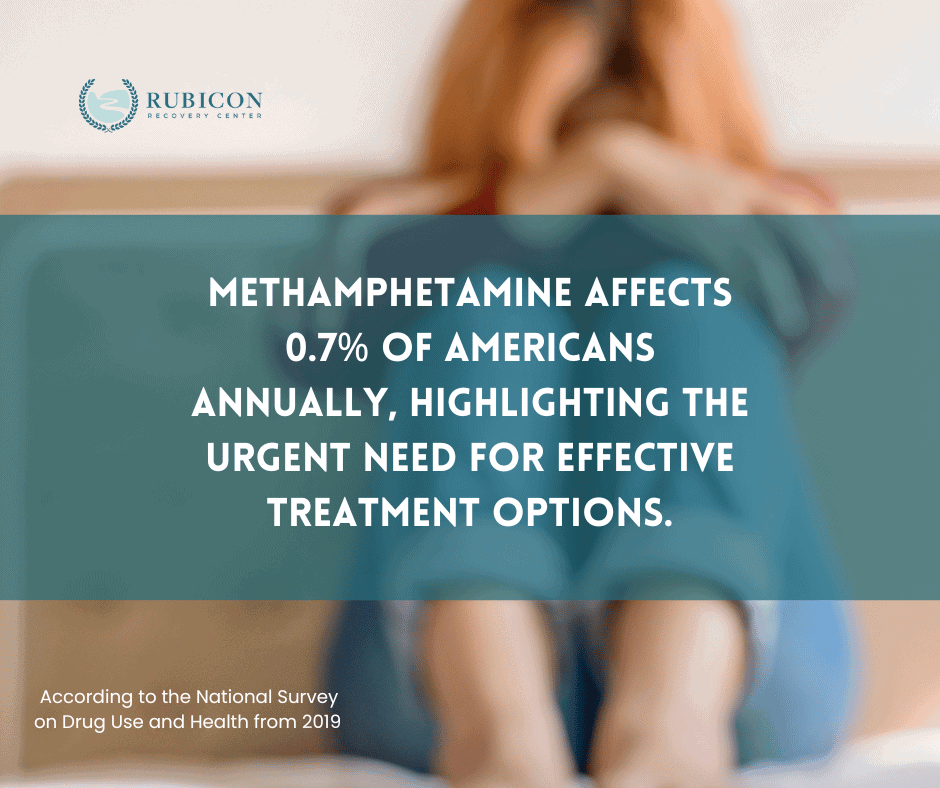
Methamphetamine affects 0.7% of Americans annually, as reported by the National Survey on Drug Use and Health from 2019, underscoring its significant public health impact. Situated in the heart of New Jersey, Rubicon Recovery stands ready to tackle the escalating challenge of meth addiction. As an outpatient treatment center, we are dedicated to providing compassionate and personalized support to individuals navigating addiction. Through evidence-based treatments and tailored recovery plans, our goal is to empower individuals to overcome addiction and achieve lasting wellness. By addressing the critical gap in care identified by recent research findings, Rubicon Recovery is committed to guiding individuals towards a brighter, substance-free future.
What Is Meth Addiction?
Meth or methamphetamine addiction is when someone develops physical and psychological dependence on meth. Methamphetamine is a powerful, highly addictive stimulant drug that affects the central nervous system, known for its ability to release high levels of dopamine rapidly in the brain, leading to intense feelings of euphoria.
A meth addiction develops when the brain becomes accustomed to these high dopamine levels, leading to the need for increasingly larger doses of the drug to achieve the same high and avoid withdrawal symptoms. Over time, this cycle of abuse can alter the brain’s chemistry, affecting areas critical for decision-making, memory, and self-control, making it extremely challenging for addicted individuals to quit on their own.
Individuals addicted to meth find it difficult to function normally without the drug and may prioritize its use over other aspects of their lives. Some general signs of addiction include drug cravings, withdrawal symptoms upon cessation, and an inability to control or reduce use.
Overcoming a meth addiction requires professional treatment, including detoxification, therapy, and support groups, to address both the physical dependence and the psychological aspects of the addiction.
It’s helpful to understand more about how to treat a meth addiction and what challenges may come up on the road to recovery so that you can get yourself or a loved one the help they need to heal.
Who Needs Rehab For Meth Addiction?
The outpatient addiction rehab at Rubicon Recovery Center is designed for any individual who finds themselves unable to stop using meth despite experiencing negative consequences such as significant harm to their health, appearance, relationships, and day-to-day well-being. We welcome people from all backgrounds who are struggling with meth addiction, no matter their prior history of drug use, overdose, or previous attempts at recovery.
A meth addiction can look different for different people, but you may need to attend a rehab program if you are experiencing any of the following behaviors:
- Withdrawal Symptoms: The presence of withdrawal symptoms signifies that an individual has developed a physical dependence on a drug, which is a key component of addiction. Some meth withdrawal symptoms include fatigue, psychosis, depression, insomnia, and increased appetite.
- Change in Social Circles: A subtle yet telling sign of drug addiction is a significant change in an individual’s social circles. Someone might withdraw from long-standing relationships and instead spend time with new friends who share and enable their drug use habits. Losing interest in social activities or hobbies that don’t involve drug use is also related to this sign.
- Neglecting Responsibilities: A hallmark sign of addiction is when an individual starts to neglect responsibilities at home, work, or school. Financial problems may also arise, often due to spending money on drugs rather than on bills, food, or other essentials.
- Decline in Wellbeing: A meth addiction can lead to noticeable declines in physical health and appearance. Some tell tale signs may include sudden weight loss or gain, poor skin condition, and neglect of personal hygiene. Sleep patterns may also be disrupted, leading to insomnia or excessive sleeping.
Our Approach To Meth Treatment In New Jersey
At Rubicon Recovery, our approach to meth treatment is rooted in evidence-based practices and personalized care. We recognize that each individual’s journey is unique and requires a personalized approach. Our team of dedicated professionals is committed to creating a tailored treatment plan that meets your specific needs, right now.
- Individual and Group Therapy: We offer individual and group therapy sessions that are designed to address the psychological and emotional components of addiction. Therapy helps individuals uncover and understand the root causes of their addiction, develop coping strategies, and build a supportive community.
- Detoxification: While Rubicon Recovery Center does not provide detox services in-house, we facilitate access to reputable detox programs for our clients. Our partner detoxification programs are supervised by medical experts, ensuring a safe withdrawal from meth. Attending a comprehensive detox program will build the foundation for a powerful recovery journey with us.
- Therapy and Counseling: We offer a range of therapeutic modalities, including individual counseling, group therapy, and family support sessions, designed to address the emotional and psychological root causes of addiction.
- Holistic Therapies: Incorporating holistic therapies such as mindfulness, yoga, and art therapy, helps individuals find balance and healing beyond traditional treatment methods and provides them with tools they can use in their everyday lives.
- Aftercare Planning: We believe that recovery is a lifelong journey, which is why we provide comprehensive aftercare planning to support our clients long after they leave our facility.
Healing from a meth addiction often requires professional support and comprehensive treatment, beginning with a medically supervised detox, and a tailored plan that includes therapy and counseling.
Although recovery can be a challenging journey, the right support and care can empower individuals to achieve lasting recovery and live drug-free lives.
How to Find Meth Addiction Treatment In New Jersey
Professional Addiction Outpatient Treatment In New Jersey
Facing any addiction is not for the faint of heart, but at Rubicon Recovery in New Jersey, we are here to support you every step of the way. Our comprehensive meth rehab and treatment programs are designed with care and expertise to provide the tools and support you need. Our healing center offers a peaceful and private environment where you can focus on healing and help move you toward a drug-free life.
Connect with us today to take a bold step forward on your journey to recovery from meth addiction. Our dedicated team is ready to guide you through our personalized treatment process and help you find the clarity you need to step toward a brighter, drug-free future.
How long does meth rehab take?
The duration of meth rehab varies depending on the individual’s specific needs, the severity of the addiction, and their progress in treatment. Typically, programs last from a minimum of 30 days to several months.
What types of meth rehab and treatment services are available at Rubicon Recovery Center?
In New Jersey, we offer a comprehensive range of meth rehab services including detoxification referrals, outpatient treatment programs, as well as individual and group therapy and long-term aftercare support.
What are the risks of long-term meth use?
Long-term meth use can lead to severe physical and mental health problems, including cardiovascular issues such as heart attack and stroke, liver and kidney damage, dental decay, increased risk of infectious diseases, cognitive decline, and an array of mental health disorders like anxiety, depression, and psychosis. The social consequences can be equally severe, including job loss, financial instability, broken relationships, and legal problems.
